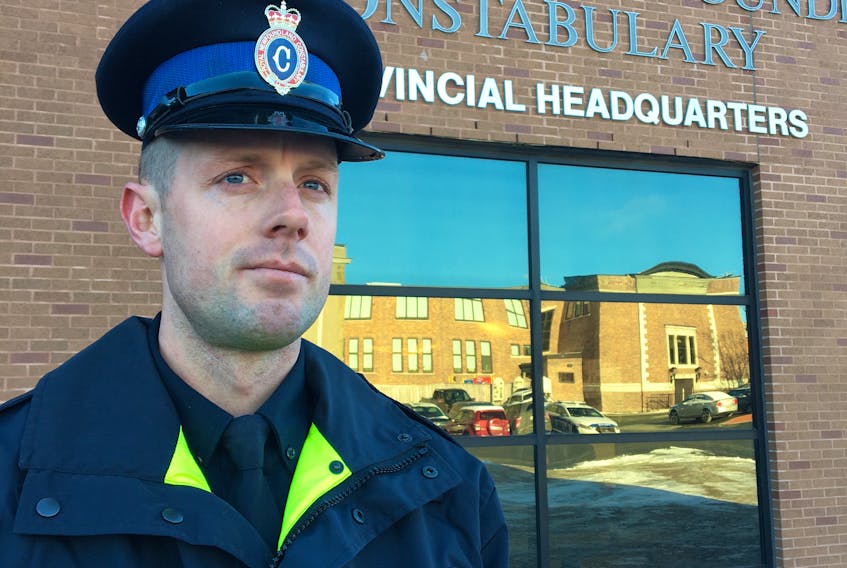ST. JOHN'S, N.L. — Tara Bradbury
The Telegram
@tara_bradbury
About $13 million in COVID-19-related fines have been issued across the country since April, the Canadian Civil Liberties Association (CCLA) estimates.
That’s about 10,000 tickets or charges, the vast majority of them in Quebec, Ontario and Nova Scotia. Only one ticket has been issued in Newfoundland and Labrador.
The independent rights watchdog released its second COVID-19-focused report in as many weeks, this time examining the country’s use of law enforcement and fines to respond to the public health crisis.
Every province and territory in Canada declared a state of emergency in March due to the COVID-19 pandemic, with restrictions on businesses, public spaces and personal movement legislated as emergency measures.
According to the CCLA, many of the laws have been vague and confusing and have attracted significant violation fines: up to $2,000 in Saskatchewan, for example.
In April, the association launched an online COVID-19 ticket tracker, asking Canadians to record their experiences and share their stories of being stopped, questioned or ticketed.
“Many of the experiences Canadians shared demonstrates how over-zealous, technical enforcement of confusing, broad and vague laws frequently led to fines that were completely disconnected with the goal of protecting public health,” the report states. “Many people were given hefty fines for minor technical violations of emergency orders: standing three feet inside an unmarked and unfenced soccer field, having a child run ahead and jump up on a park bench for a few seconds or walking alone on a path that the municipality had specifically flagged as open, only to receive a ticket when a police officer disagreed on the legal interpretation.”
Some people reported receiving tickets for things that weren’t contrary to the emergency orders at all, the CCLA reported, like having a dog off-leash or sharing a ride home from work with an essential services coworker.
COVID-19 policing reportedly disproportionately affected some specific communities across the country, including Black, Indigenous, those with precarious housing situations, recent immigrants, members of the 2SLGBTQ+ community and certain religious minorities. Numerous people who contacted the CCLA reported feeling they had been targeted by law enforcement because of their race.
“The pandemic has also been used as a justification to increase the ability of a variety of law enforcement officials to stop individuals and demand that they provide identification, a practice known as ‘carding,’ which has been used disproportionately against people who are Black, Indigenous, who have mental-health disabilities, who are experiencing homelessness and who are otherwise racialized and marginalized,” the CCLA wrote.
Instead of a policing approach, the association said, it’s an educational approach and public health supports that are needed.
“For some provinces in Canada, the focus was on education, not enforcement, and many provinces very fittingly ‘flattened the curve’ of the pandemic by relying on public health recommendations and education.”
Newfoundland and Labrador is one of those provinces, with only one person ticketed for violating the COVID-19 rules. That person, a woman in Corner Brook, was arrested twice in the same week and charged after she refused to comply.
The Royal Newfoundland Constabulary and the local RCMP have come under fire from some public commenters for being too soft when it comes to enforcing COVID-19 rules, but have maintained since the start that their approach would be one of education over strict enforcement.
The RNC and the RCMP did establish dedicated COVID-19 teams, with members taking information provided by the public, opening investigations and making visits to those suspected of violating the rules.
"Residents and businesses can expect to hear from us when violations are reported," RCMP Sgt Major Doug Pack said at the end of April. "Our first approach is to educate and urge voluntary compliance. Enforcement of orders will follow should individuals choose not to comply. I am pleased to note that we are seeing great co-operation from the public and most reports are being resolved through voluntary compliance by the individuals contacted."
Instead of tickets or charges, RNC officers issued information packets related to the coronavirus and current public health rules and guidelines.
“The compliance was overwhelming,” RNC Const. James Cadigan told The Telegram. “When we came into this pandemic, we knew there would be challenges, but as a police force, we have to adapt to the needs of the community. I feel that this community has been tested this year in many ways, first with Snowmaggedon and then the COVID-19 pandemic, and I think we really saw a community that respects and appreciates that we all have to come together and work together to get through these things.”
The COVID-19 reporting line — which the CCLA refers to in its report as one of 30 “snitch lines” set up across the country, most of them in Ontario — is still active, Cadigan said, though fewer tips may come in now that the province has downgraded to Alert Level 2. Not all the tips have led to a visit, he said, but the reporting line has been useful.
“It has allowed us to contact parts of the community that needed some education or a conversation related to mitigating the risk of COVID-19,” Cadigan said. “The education aspect is certainly important, but accountability is also important.”
The CCLA — which is currently taking the Government of Newfoundland and Labrador to court over its COVID-19 travel ban, arguing it breaches constitutional rights — says if the country experiences the predicted second wave of coronavirus infection, all provinces should adapt an education-focused public health approach that respects public rights.
“When rules don’t make sense, people stop listening to those in authority,” the association wrote. “When laws are unworkable or indecipherable, people ignore them. When enforcement is unfair, arbitrary and discriminatory, people become less compliant and more defiant. They focus less on trying to obey the rules and think more about trying not to get caught.”









